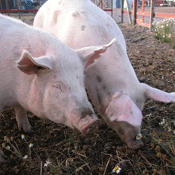Read our previous stories on the UMMC pig issue from Jan. 24 and Jan. 26.
Hinds County Attorney Sherri Flowers said she is trying to find the correct agency to investigate allegations of animal abuse at the University of Mississippi Medical Center.
The Physicians Committee for Responsible Medicine, an animal-rights advocacy group, has asked Flowers to investigate UMMC's use of live pigs in first-year medical labs. "My agency can't investigate; we're prosecutors," Flowers said. "It has to be reported to an agency so they can investigate it." Flowers said she is looking into whether the state Department of Wildlife and Fisheries, the Department of Agriculture or another agency has the authority to investigate.
In a letter sent to Flowers last week, Dr. John Pippin, senior research and medical adviser with PCRM, wrote that UMMC violates Mississippi's animal cruelty law by having students practice medical techniques on 32 live pigs each year.
The pigs are anesthetized, and students practice medical procedures, such as placing catheters into arteries, on the pigs, PCRM says. After the lab, veterinary staff members euthanize the pigs, UMMC officials say. The PCRM letter said the medical school is needlessly mutilating and killing the animals in violation of Mississippi law.
Pippin said he and others at PCRM have worked for five years to get UMMC to stop using pigs in its labs. He said they talked to UMMC officials, but have not gotten any meaningful response. He added thata proper literature search shows that alternatives to using live pigs are available, and he hopes UMMC will change its lab protocol.
Pippin said his organization might go to the police or to court if the letter to Flowers does not yield results.
"We will continue our efforts until the use of pigs is stopped," he said.
In January, PCRM filed a complaint about the use of live animals at UMMC with the USDA. The USDA's Animal and Plant Health Inspection Service conducted a routine inspection of UMMC's use of pigs Jan. 27. In a report, the inspector wrote that the course director's written report on investigating alternatives to using live pigs was incomplete. The inspector cited UMMC for not specifying which keywords the course director used in a review of literature about alternatives, and for not identifying, considering or explaining all alternatives to the painful procedures.
Jack Mazurak with the Division of Public Affairs at UMMC said Friday that the course director for the lab had done the required searches for alternatives to using live pigs. "The course director had done the search, had written up the narrative ... and is very much aware of what other methods are out there, but the description was not as detailed or robust as this inspector would like to see," Mazurak said.
He added that the course director is now rewriting the description of the search to explain exactly what search terms and databases were used.
A statement released by UMMC said the school uses computer simulations in classes, but they are not completely accurate substitutes for real animals.
"Running a scenario on a computer program multiple times returns the same result every time," the statement said. "However, results in live animal models vary, just as with human patients." The statement said that encountering variations in different animals helps students think critically procedures they will one day perform on human patients.
Students may opt out of participating in the lab, but most find it a valuable experience, the statement said.
Within the past few years, PCRM has waged successful campaigns to get other schools to stop using animals in labs. In January, the Jackson Free Press reported that the University of Southern Alabama, the University of Wisconsin and the University of Tennessee in Memphis had stopped using live pigs in medical training within the past two years after pressure from PCRM.
PCRM's letter to Flowers stated that only seven out of 177 accredited medical schools in the United States and Canada--4 percent--use live animals to train students.


